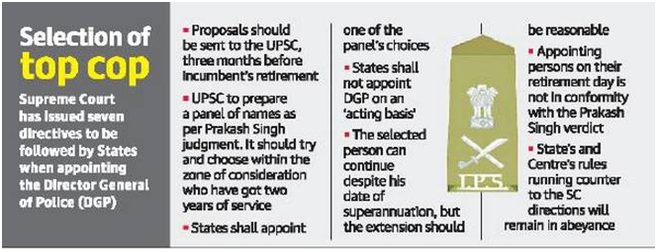Prakash Singh Guidelines on the Appointment of the DGP
18-02-2024
01:36 PM
1 min read

What’s in Today’s Article?
- Why in News?
- Director General of Police (DGP)
- The SC’s Prakash Singh Judgement on Police Reforms
- The Case of Appointment of Temporary DGPs

Why in News?
- The Ministry of Home Affairs (MHA) has told “defaulting” states to follow the SC’s directives (in the Prakash Singh case) on the appointment of the Director General of Police (DGP).
- This development came days after a report highlighting the trend of state govts (Andhra Pradesh, Telangana, UP, Punjab, etc) not appointing regular police chiefs (DGPs) despite the availability of eligible officers.
Director General of Police (DGP)
- About: In India, the DGP is the highest-ranking police officer in a state or union territory, and is also known as the State Police Chief.
- Criteria for appointment:
- The appointment process (as per 2018 SC directive):
- Contention over the appointment process:
- Several states have passed laws or executive orders to circumvent the empanelment process (required for the appointment of DGP) of the UPSC. The West Bengal government has asked the SC to modify its 2018 judgement.
- Reasons for the contention:
- The police and public order are solely within the jurisdiction of the state
- Until Parliament passes a new statute, the UPSC does not have the authority to consider and appoint the DGP.
- Under the principles of judicial review or in the use of the court's extraordinary authority (Article 142 - Power to issue orders for doing complete justice), the SC should not limit a state's legislative capabilities.
The SC’s Prakash Singh Judgement on Police Reforms
- Background: Prakash Singh, who served as the DGP of the Uttar Pradesh Police and the Assam Police, among other positions, filed a PIL in the SC in 1996, requesting police reforms.
- The landmark judgement of 2006: The SC, in mandating all states and UTs to implement police reforms, outlined a list of steps that governments must follow to ensure that the police may execute their jobs without fear of political interference.
- The measures suggested by the SC: The 7 main directives from the SC in the verdict were -
- Fixing the tenure and selection of the DGP: This is to avoid the situations where officers about to retire in a few months are given the post.
- No political interference: In order to ensure this, a minimum tenure was sought for the Inspector General of Police so that they are not transferred mid-term by politicians.
- Constitute Police Establishment Boards (PEB): Comprising police officers and senior bureaucrats to insulate powers of postings and transfers from political leaders.
- Set up the State Police Complaints Authority (SPCA): This is to give a platform where common people aggrieved by police action could approach.
- Separation of investigation and law and order functions of police.
- Set up State Security Commissions (SSC) and a National Security Commission: They will advise the government (State/National as the case may be) on broad policy guidelines for better policing, organisational goals to initiate preventive measures, etc.
- How did states respond to these directives? According to a Commonwealth Human Rights Initiative (CHRI) report (2020),
- Not a single state fully complied with the apex court directives in the Prakash Singh case.
- After 2006, 18 states passed or updated their Police Acts, although none of them entirely matched the legislative models outlined in the 2006 decision.
- Some states pointed out “flaws” in the SC judgement in the Prakash Singh case.
- The CM should have some discretion over who is best suited to lead the police force and the government’s choice may not necessarily be among the three senior-most.
The Case of Appointment of Temporary DGPs
- States where temporary DGPs were appointed:
- While Andhra Pradesh, Telangana, UP and Punjab have had such temporary DGPs for almost or more than a year, 3 other states, Uttarakhand, Odisha and West Bengal, and the UT of J&K, have recently appointed “acting DGPs”.
- UP has had four acting DGPs in the past 20 months.
- The MHA Directive to the Defaulting States:
- The defaulting states must follow SC directions and Union Public Service Commission guidelines on appointment of regular DGPs with a tenure of two years.
- The temporary or “acting DGPs” are to be appointed only in exceptional circumstances.
Source: Avoid naming acting DGPs, follow Supreme Court’s guidelines: MHA to states



